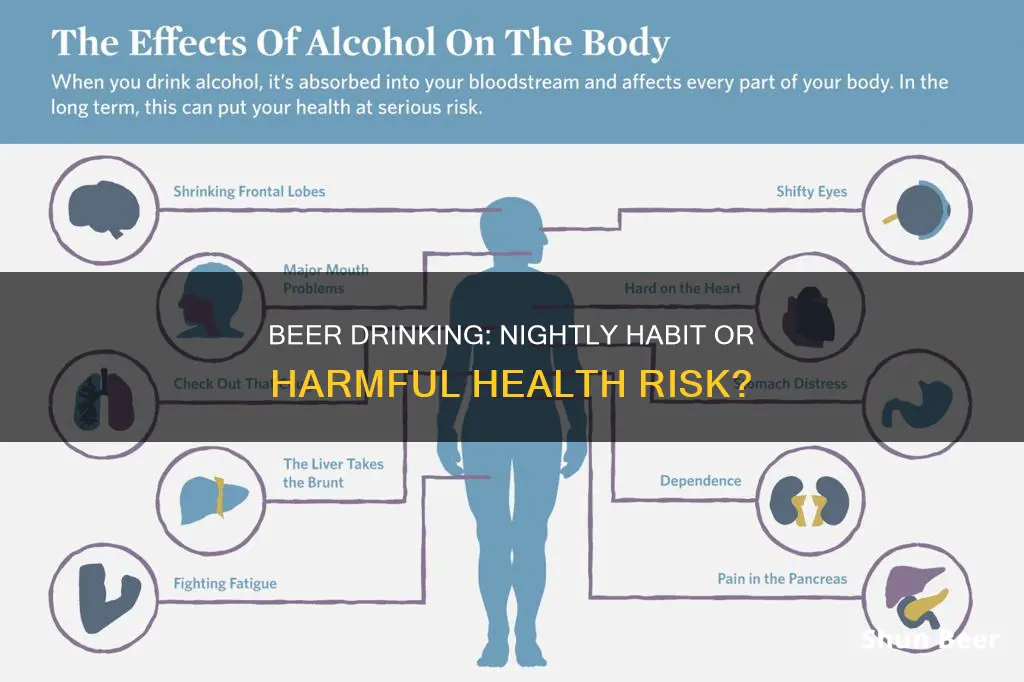
Beer is the most popular alcoholic drink in the United States, with the beer industry generating around $109 billion in revenue in 2021. While some studies suggest that moderate beer consumption may offer certain health benefits, such as boosting heart health and providing essential nutrients, drinking beer every night can have negative consequences for your health. In this article, we will explore the effects of nightly beer consumption and discuss whether it is okay to indulge in this daily habit.
| Characteristics | Values |
|---|---|
| Health benefits | Increased bone density, improved gut health, better lipid levels |
| Negative health effects | Weight gain, liver disease, sleep disorders, dehydration, weakened immune system, nutrient deficiencies, skin issues, coordination issues, blood sugar dysregulation, increased cancer risk, heart disease |
| Acceptable intake | 2 drinks for men per day, 1 drink per day for women |
| Binge drinking | 5 drinks in a 2-hour period for men |

Beer's impact on weight
Beers Impact on Weight
Beer is associated with a high accumulation of abdominal fat, also known as a "beer belly". This is because beer is often referred to as "empty" calories—calories that provide your body with energy but contain very little in the way of nutrients. An average 12-ounce beer has around 150 calories, and the more alcohol by volume (ABV) in the beer, the higher the calorie count.
The liver prioritises metabolising alcohol because it is seen as a toxic substance. This means that other functions of the liver, such as metabolising fat, are delayed until the alcohol is out of your system. This can lead to increased fat storage and, in turn, weight gain.
Beer can also negatively impact your weight by:
- Affecting your sleep, which can lead to an imbalance in the hormones related to hunger, satiety, and energy storage.
- Lowering your inhibitions, making you more likely to overeat and make unhealthy food choices.
- Affecting your digestion and nutrient uptake, as alcohol stresses the stomach and intestines, decreasing digestive secretions and the movement of food through the tract.
- Increasing your appetite, as studies have shown that alcohol can trigger hunger signals in the brain.
However, it's important to note that moderate drinking as part of an already healthy lifestyle (a healthy diet and regular physical activity) is not destined to cause weight gain.
Beer and Wine: Mixing Drinks, What's the Verdict?
You may want to see also

Sleep quality
Drinking beer, or any alcoholic beverage, every night can have a significant impact on sleep quality. While a beer may initially make you feel drowsy, research suggests that alcohol interferes with sleep quality, leading to frequent awakenings and a lack of restorative rest. This can result in sleep disorders and fatigue during the day.
Michael Masi, CPT, a certified personal trainer at Garage Gym Reviews, explains:
> Alcohol has been shown to reduce the time it takes to fall asleep and increase the amount of deep sleep during the first half of the night. However, this effect reverses during the second half of the night. Alcohol consumption can lead to more frequent awakenings, reduced REM (rapid-eye movement) sleep—crucial for memory and mood regulation—and an overall lighter, more fragmented sleep. This disruption can result in waking up feeling unrefreshed and tired, regardless of sleep duration.
A 2018 study published in JMIR Mental Health compared the sleep quality of participants who consumed different amounts of alcohol and found that even light drinkers (defined as drinking two or fewer servings for men, and one or fewer for women) experienced a 9.3% decrease in sleep quality. When consuming alcohol, the liver kicks into gear to metabolize it, which can result in a fitful night of sleep.
According to Kimberly Gomer M.S., RD, LDN:
> The alcohol in beer can affect the brain so that reflexes are slowed down, and [your] balance, memory and sleep may be impaired.
The National Institute on Alcohol Abuse and Alcoholism (NIAAA) also states that alcohol can affect the brain's communication pathway and even impair the brain's ability to process information.
Leftover Beer: Is It Safe to Drink?
You may want to see also

Health risks
Drinking beer every night can have several negative impacts on your health. Firstly, beer is high in empty calories, with an average 12-ounce beer containing around 150 calories. This can contribute to weight gain, especially if you consume multiple beers per night, and can lead to health issues such as obesity and its associated complications.
Secondly, beer, like any other alcoholic beverage, can affect your sleep quality. While it may initially make you drowsy, research suggests that alcohol interferes with sleep, leading to frequent awakenings and a lack of restorative rest. Over time, this can result in sleep disorders and fatigue during the day.
Thirdly, drinking beer every night can increase your risk of developing liver disease. Excessive alcohol intake can lead to liver inflammation, fatty liver disease, and cirrhosis over time.
Additionally, drinking beer can cause dehydration as alcohol is a diuretic, encouraging your body to expel more fluids than you're taking in. Dehydration can result in headaches, fatigue, excessive thirst, and lethargy. It can also lead to dry, flaky skin and reduced skin elasticity, contributing to the development of fine lines and wrinkles.
Excessive alcohol consumption can also weaken your immune system, making you more susceptible to infections. It can also interfere with the absorption of essential vitamins and minerals, leading to potential nutrient deficiencies, particularly B vitamins, which are critical for energy production and overall health.
Furthermore, drinking beer every night can increase your risk of developing certain types of cancer. According to the National Cancer Institute, daily beer consumption is linked to a higher risk of mouth, throat, and esophageal cancer. The ethanol in beer can damage the cells lining these areas, making them more susceptible to cancer development.
Lastly, drinking beer can affect your coordination and motor skills, leading to impaired judgment and an increased risk of accidents and injuries. It can also impact your blood sugar levels, potentially causing insulin resistance and an increased risk of type 2 diabetes.
Beerfest: Fact or Fiction?
You may want to see also

Addiction
Drinking a beer or two every night is not necessarily a sign of addiction or abuse, and it may not lead to alcohol abuse later on. However, it is important to understand the risks and consequences of regular alcohol consumption to make informed decisions about your health.
Health Risks and Consequences
While moderate drinking may be linked to certain health benefits, such as improved heart health and increased bone density, it is essential to consider the potential negative impacts on your overall health. Regular beer consumption can lead to weight gain, liver problems, sleep disorders, dehydration, and nutrient deficiencies. It can also increase the risk of chronic diseases, including high blood pressure, stroke, heart failure, and certain types of cancer. According to the National Cancer Institute, daily beer consumption is associated with an increased risk of mouth, throat, and esophageal cancer. Additionally, excessive alcohol intake can suppress immune function, making individuals more susceptible to infections.
Defining Addiction
Binge Drinking and Abuse Disorder
Binge drinking is defined as consuming a large amount of alcohol in a short period. For men, this typically means having five or more drinks in a two-hour period. If an individual engages in binge drinking on weekends while also drinking moderately every night, they are at an elevated risk for an abuse disorder. According to the National Institute on Alcohol Abuse and Alcoholism (NIAAA), drinking more than 14 drinks per week for men and seven drinks per week for women is considered "heavy" or "at-risk" drinking, with about 25% of people who drink at these levels having an alcohol use disorder.
Seeking Help
If you or someone you know is struggling with alcohol addiction, it is crucial to seek professional help. Resources such as the substance abuse hotline (1-800-662-HELP) or contacting your doctor are good starting points to address these concerns and develop a treatment plan.
Beer Drinking in Oklahoma: Sunday's Special Rule
You may want to see also

Safe drinking guidelines
While drinking a beer or two is a common way to unwind, it's important to be mindful of the health implications of regular drinking. Here are some safe drinking guidelines to help you make informed decisions about alcohol consumption:
- Standard Drinks and Serving Sizes: It's crucial to understand what constitutes a "standard drink" or "serving." In the United States, one standard drink contains approximately 14 grams of pure alcohol. This is typically the amount found in 12 ounces of regular beer (5% alcohol), 5 ounces of wine (12% alcohol), or 1.5 ounces of distilled spirits (40% alcohol). However, different types of beer, wine, and spirits can have varying alcohol percentages, affecting the number of standard drinks they contain.
- Weekly Upper Limits: To maintain overall health, it's recommended that men should not exceed four drinks in a day or 14 drinks per week. For women, the guidelines suggest no more than three drinks in a day or seven drinks per week. Consuming more than these amounts is considered "heavy" or "at-risk" drinking and significantly increases the likelihood of developing health problems.
- Binge Drinking: Binge drinking refers to consuming large amounts of alcohol in a short period. For men, it involves having five or more standard drinks in a span of 2 hours, while for women, it's four or more standard drinks in the same time frame. Binge drinking can lead to immediate health risks and negative consequences.
- Risky Drinking: Risky drinking means consuming too much alcohol too often. For men, this typically means having more than four drinks within a day. For women, risky drinking is defined as consuming three or more drinks within the same timeframe. It's important to note that drinking patterns matter; regularly drinking heavily and frequently is considered risky behaviour.
- Health Risks: Regular and excessive alcohol consumption can have detrimental effects on your health. It can lead to liver damage, including inflammation (alcoholic hepatitis) and, in severe cases, scarring of the liver (cirrhosis). Additionally, risky drinking increases the risk of stroke, cardiomyopathy, high blood pressure, and several types of cancer. Alcohol can also disrupt your sleep, impair your reflexes and balance, and affect your brain's ability to process information.
- Medications, Medical Conditions, and Pregnancy: If you are taking medications that interact with alcohol, managing a medical condition that alcohol can worsen, or are pregnant or planning to become pregnant, it is safest to avoid alcohol altogether. Alcohol can negatively impact your health and the development of the fetus.
- Driving and Operating Machinery: Alcohol impairs reflexes and coordination. Therefore, it is crucial to refrain from drinking when planning to drive or operate any machinery. This is essential for your safety and the safety of others.
- Age Restrictions: In the United States, the minimum legal drinking age is 21 years old. Individuals under this age should not consume alcohol.
- Individual Variation: It's important to remember that everyone's body is different, and some people may be more sensitive to alcohol than others. Always drink responsibly and be mindful of your personal limits.
- Low-Risk Guidelines: Any amount of alcohol consumption carries some health risks. The guidelines provided by various health organizations are intended to minimize these risks but do not guarantee zero risk. If you choose to drink, it's important to stay within the recommended limits and be aware of the potential dangers associated with alcohol consumption.
Beer and Celiac Disease: Is There a Link?
You may want to see also
Frequently asked questions
Drinking beer every night can have several negative health consequences, including weight gain, liver problems, sleep disorders, dehydration, and nutrient deficiencies. It is generally recommended that men have no more than two drinks per day and women no more than one drink per day.
Drinking beer every night can lead to weight gain due to the high calorie content of beer. It can also cause liver problems, including inflammation, fatty liver disease, and cirrhosis. Additionally, beer can interfere with sleep quality, leading to frequent awakenings and fatigue during the day.
Some studies suggest that moderate beer consumption may offer certain health benefits, such as boosting heart health and increasing bone mineral density. Beer also contains antioxidants and polyphenols, which may have additional health benefits. However, it is important to note that excessive alcohol consumption can increase the risk of chronic diseases and certain types of cancer.
According to the National Institute on Alcohol Abuse and Alcoholism (NIAAA), drinking more than four drinks per night or more than 14 drinks per week is considered "heavy" or "at-risk" drinking. This puts individuals at a higher risk for developing health problems and alcohol use disorders. Binge drinking is typically defined as consuming five or more drinks in a two-hour period for men and four or more drinks in a two-hour period for women.







